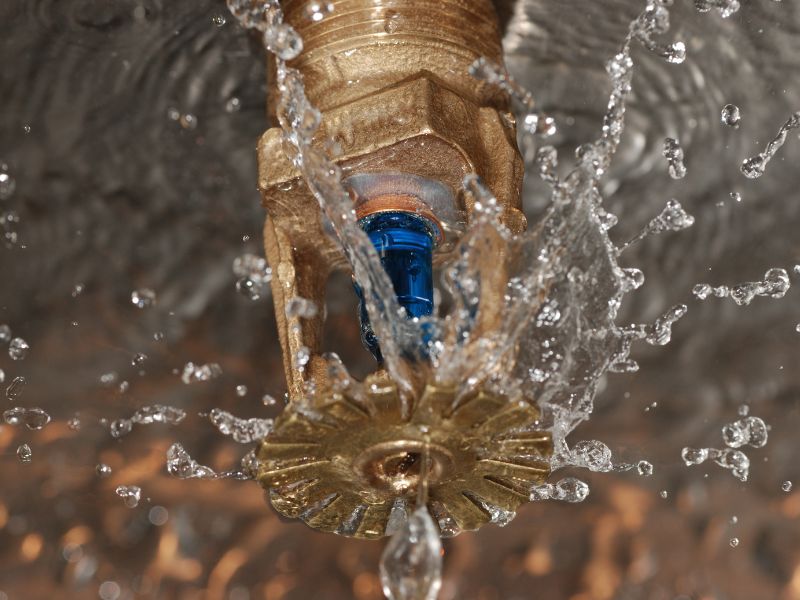
Sprinkler systems are one of the best ways to protect your home or business from fire danger. According to the American Fire Sprinkler Association, fire sprinklers are considered the best method to fight the spread of fires and limit property damage and fatalities.
As a business owner, you need some fire protection in your office or warehouse. But how do fire sprinklers work, and how can you choose the best system for your building? Let’s explore those questions together.
How do fire sprinklers work within buildings?
A good place to start is to ask, how does a fire sprinkler system work? A fire needs oxygen, heat and fuel to burn effectively. As such, the best way to get rid of fire is by eliminating any of these three elements. Water is an effective measure against fire because it removes heat by dissipating it as the fire expends itself turning liquid water into steam. This is where fire sprinkler systems come in. A fire sprinkler system senses heat. So when a building gets too hot, the sprinkler system is triggered, which covers the fire in water, eliminating the fire risk.
Sprinklers are also incredibly effective because they react quickly, containing a fire risk and potentially even eliminating that risk before the fire department has time to arrive.
Fire Sprinkler Myths
When it comes to answering how do fire sprinklers work, it’s helpful to understand what they won’t do. Even though they’re a popular solution, myths about fire sprinklers still persist, according to the National Fire Protection Agency (NFPA). Are you worried about installing a fire sprinkler system? Don’t be! Here are some of most common myths debunked:
- Sprinkler systems can go off accidentally, damaging valuable business equipment: this is untrue. It’s extremely rare for sprinklers to discharge accidentally. In most homes, a plumbing issue will cause more damage than an accidental sprinkler discharge.
- Burnt toast will set off the sprinkler: smoke from something as small as burnt toast won’t cause the sprinkler to discharge. Sprinklers are designed to go off when a significant amount of smoke or heat appears.
- If a fire occurs, sprinklers all over your home/business will go off, getting water everywhere: this is one of the most common sprinkler misconceptions. Not all your sprinklers will discharge at once, only the sprinklers that are closest to the risk.
Four Types of Fire Sprinkler Systems
There are four different types of fire sprinkler systems. We explain how all of these systems work in our blog, but for our purposes, we’re going to discuss the most common types of sprinkler systems used in commercial buildings (such as your business).
- Wet pipe fire sprinkler systems: this is the most common and cost-efficient type of fire sprinkler system found in most offices, schools and residential buildings. These systems require water in the pipes, so the building must be kept at a minimum temperature (usually above 40 degrees Fahrenheit). This system is not suitable for a warehouse.
- Dry pipe fire sprinkler systems: this system is suitable for unheated warehouses, cold areas, parking garages and attics.
- Pre-action fire sprinkler systems: this system is more sophisticated and can prevent accidental activations. It’s perfect for museums, server rooms, data farms and any business where you wouldn’t want valuable technology or paperwork to get wet.
- Deluge fire sprinkler systems: this type of sprinkler system is fantastic for businesses with very combustible materials (think aircraft hangars, industrial plants and large-scale manufacturing businesses).
How to choose a system for your business?
Choosing your fire sprinkler for your business doesn’t have to be complicated. However, we recommend taking into account the following:
- Type of business: the kind of business you operate radically affects your choice of fire sprinkler system. Ask your fire sprinkler installation professional for their thoughts.
- Type of fire: you may think that fires, especially business fires, are unpredictable. However, this isn’t true. According to the US Fire Administration (USFA), the most common types of fires in non-residential buildings stemmed from cooking (29.9 percent), carelessness (11.5 percent), arson (10.8 percent), and electrical malfunction (7.3 percent). Why does this matter? Assess your business for the likelihood of any of these types of fires. Does your office have a kitchen? What types of electrical systems do you use in your business, and are they maintained regularly? An ounce of prevention is worth a pound of cure, especially when it comes to fire.
- Location of sprinkler system: again, this comes back to the type of business you own and the potential fire risk. Assess your business against fire risk and code, choose the correct fire sprinkler system, and proceed accordingly.
- Cost of installation and maintenance: maintenance and installation are high costs that should be considered when installing your fire sprinkler system. At a minimum, inspect sprinkler systems at least once per year.
How do fire sprinklers work? The next step in installing your new system is to contact our team. Give us a call to further discuss your needs!



